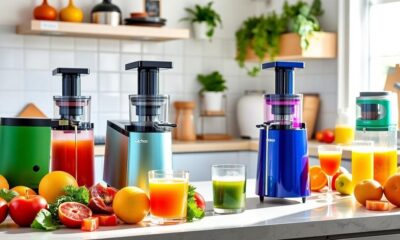Juice Tips and Tricks
How Much Is Orange Juice

Being someone who loves starting their day with a refreshing glass of orange juice, I have often wondered about what factors contribute to its price. With a wide range of orange juice products available in the market, determining the best value for money can be quite challenging.
In this article, I aim to provide a comprehensive guide on the price of orange juice, including the various factors that influence it and tips on how to save money while still enjoying your favorite drink.
Orange juice is a popular beverage worldwide, known for its refreshing taste and nutritional benefits. However, the price of orange juice can vary significantly depending on several factors. These factors could include the type of orange juice, its quality, and the location of where it’s sold.
As someone who is interested in knowing how much orange juice costs and who wants to make informed purchasing decisions, it’s important to understand these factors and how they affect the price of orange juice.
So, let’s dive in and explore the world of orange juice and its pricing.
Key Takeaways
- Store-bought orange juice prices vary based on brand, container size, and type, with a 64-ounce container ranging from $2.99 to $7.99.
- Tropicana, Simply Orange, and Florida’s Natural are some of the best brands to look for when purchasing orange juice.
- Frozen orange juice is a convenient and cost-effective option that can be stored for months, while frozen orange juice concentrate is versatile and used in various recipes.
- Organic orange juice is made from organically grown oranges and is free from synthetic pesticides and fertilizers, but may have a higher cost than non-organic options.
Overview of Orange Juice
Orange juice is a popular breakfast beverage that’s often enjoyed alongside pancakes and bacon. However, it’s more than just a tasty drink. Orange juice is packed with health benefits and nutritional value that make it an excellent choice for starting your day.
For example, it’s rich in vitamin C, which supports a healthy immune system, and it also contains potassium, folate, and thiamine, which are all essential nutrients for our bodies.
But how is orange juice made and distributed to consumers? The orange juice production process begins with harvesting the oranges, which are then washed and squeezed to extract the juice. The juice is then pasteurized to eliminate any harmful bacteria and packaged for distribution.
The supply chain for orange juice is complex, with oranges being grown in different regions and transported to processing plants before being distributed to retailers. All of these steps can affect the price of orange juice, which brings us to the next section about the factors that influence its cost.
Factors that Affect Orange Juice Prices
You’ll notice that the price of orange juice can fluctuate based on a variety of factors. One of the main factors affecting orange juice prices is seasonality. In the winter months, oranges are in peak season and there is an abundance of supply, which often leads to lower prices. In contrast, during the summer months, there is less supply, which can drive up the price of orange juice.
Another factor that affects orange juice prices is supply and demand. If there’s high demand for orange juice and a limited supply, prices will likely increase. On the other hand, if there’s a surplus of oranges and low demand for orange juice, prices may decrease.
Additionally, the cost of production can also impact the price of orange juice. Factors such as labor costs, transportation costs, and the cost of packaging materials can all contribute to the final price of orange juice.
When it comes to fresh-squeezed orange juice, there are additional factors that can affect pricing. Stay tuned to learn more about the difference between fresh-squeezed orange juice and store-bought orange juice and how that impacts the price.
Fresh-Squeezed Orange Juice
If you’re looking for a taste that’s fresh and invigorating, nothing beats a glass of homemade orange juice. The juicing techniques used to make this type of juice ensure that the flavor is at its peak and the nutritional benefits are maximized.
Fresh-squeezed orange juice is rich in vitamins and minerals such as vitamin C, potassium, and folate. These nutrients are essential for maintaining a healthy immune system, promoting healthy digestion, and reducing the risk of chronic diseases.
When making fresh-squeezed orange juice, it’s important to use high-quality oranges that are ripe and juicy. The juicing process can be done by hand, using a citrus juicer, or a high-powered juicer. The type of equipment used will determine the amount of pulp in the final product. Some people prefer their juice with pulp, while others prefer it without.
Either way, fresh-squeezed orange juice is a delicious and healthy beverage option. Moving on to the next section about store-bought orange juice, it’s important to note that while it may be convenient, it often lacks the nutritional benefits of fresh-squeezed juice.
Store-Bought Orange Juice
I love drinking orange juice, but sometimes it’s just not practical to squeeze my own.
That’s where store-bought orange juice comes in.
There are a few different types to choose from, including pulp-free, low-pulp, and high-pulp.
Prices can vary depending on the brand and the size of the container, but generally range from about $2 to $6.
Types of Store-Bought Orange Juice
There are various types of store-bought orange juice available, with pulp-free being the most popular option, accounting for about 50% of sales. Here are some other types of orange juice you might come across:
- Low-pulp orange juice: This type of orange juice has some pulp, but not as much as the high-pulp variety.
- High-pulp orange juice: This type of orange juice has a lot of pulp, which some people prefer for the added texture.
- Calcium-fortified orange juice: This type of orange juice has added calcium to increase its nutritional value.
- Organic orange juice: This type of orange juice is made from organically grown oranges and is free from synthetic pesticides and fertilizers.
When it comes to flavor profiles, store-bought orange juice can vary depending on the type. Pulp-free orange juice typically has a sweeter taste, while high-pulp orange juice has a more complex flavor. In terms of nutritional value, orange juice is a good source of vitamin C and other nutrients, but it can also be high in sugar.
Moving on to the topic of price range, it’s important to note that the cost of orange juice can vary depending on the brand, type, and size of the container.
Price Range
The cost of store-bought orange juice can vary greatly based on factors such as brand, container size, and type. In general, a 64-ounce container of orange juice can range from $2.99 to $7.99, with organic and high-pulp varieties being on the higher end of the spectrum. Additionally, the gallon of orange juice price tends to be more expensive than smaller sizes but offers better value per ounce. Bulk purchases or store brands may offer more affordable options. However, premium brands or those with added nutrients can elevate the gallon of orange juice price significantly.
Store-bought orange juice can be a good source of vitamin C and other essential nutrients. However, it’s important to choose brands that don’t have added sugars or artificial flavors. Some of the best brands to look for include Tropicana, Simply Orange, and Florida’s Natural.
It’s important to note that while frozen concentrates may be cheaper than store-bought options, they may not provide the same level of nutritional benefits.
Frozen Orange Juice
You can almost taste the sweet tanginess of frozen orange juice as it sits in the carton in your freezer. It’s a convenient option for those who don’t have the time or equipment to juice fresh oranges.
Here are some reasons why frozen orange juice might be a good choice for you:
- It’s easy to store: Frozen orange juice can be kept in the freezer for months, so you can always have it on hand.
- It’s cost-effective: Buying frozen orange juice concentrate is often cheaper than buying fresh oranges or using a juicing machine.
- It’s consistent: Frozen orange juice concentrate is made from a blend of oranges, so you can expect a consistent taste and quality every time.
- It’s versatile: Frozen orange juice concentrate can be used in a variety of recipes, from smoothies to cocktails to marinades.
- It’s convenient: With frozen orange juice concentrate, you don’t have to worry about squeezing oranges or cleaning up a juicing machine.
Speaking of juicing machines, let’s move on to concentrated orange juice.
Concentrated Orange Juice
Moving on from frozen orange juice, let’s talk about concentrated orange juice. Concentrated orange juice is made by removing the water content from freshly squeezed orange juice. This process makes the juice more concentrated and easier to store for long periods. To use it, you simply need to add water to the concentrate in a process called reconstitution.
Reconstitution process is simple, you just need to mix the appropriate ratio of concentrate and water together. The ratio will depend on the brand and type of concentrate you have. It is important to read the label carefully to ensure that you are mixing it correctly. Concentrated orange juice has a longer shelf life than fresh orange juice, but it is important to note that it may not have the same nutritional value as fresh juice. Some of the nutrients may be lost during the concentration process.
Moving on to the next topic, let’s talk about organic orange juice.
Organic Orange Juice
Now that we’ve covered concentrated orange juice, let’s dive into the world of organic OJ and discover its unique benefits.
Organic orange juice is made from oranges that aren’t grown with synthetic fertilizers, pesticides, or other harmful chemicals. The fruit is harvested and processed using natural methods that ensure the preservation of its nutritional value and flavor.
One of the key benefits of organic orange juice is that it’s certified organic. This means that it’s been independently verified to meet strict standards set by the USDA. Organic certification ensures that the product is free from harmful chemicals and is produced using sustainable farming practices.
In addition, organic orange juice is packed with vitamins, minerals, and antioxidants that are essential for maintaining good health. It’s a great source of vitamin C, which helps boost the immune system and promotes healthy skin, hair, and nails.
When it comes to comparing prices of different types of orange juice, there are many factors to consider. While organic orange juice may be more expensive than its non-organic counterparts, the health benefits make it worth the investment. Plus, many retailers offer discounts and promotions on organic products, making it more accessible and affordable for consumers.
So, if you’re looking for a delicious and healthy way to start your day, consider switching to organic orange juice.
Comparing Prices of Different Types of Orange Juice
When it comes to buying orange juice, I always compare the cost per ounce and cost per serving for different types. This helps me make an informed decision on which product provides the best value for my money.
By analyzing the data-driven information on pricing, I can ensure that I’m getting the most for my money and enjoying my orange juice without breaking the bank.
Cost per Ounce
Hey, did you know that you can get orange juice for as low as 5 cents per ounce at some grocery stores? That’s right! The average price of orange juice per ounce is around 10-15 cents, but if you do some price comparison, you can find some great deals.
Here are two sub-lists to help you make the most of your orange juice budget:
- Look for store brand orange juice. It’s often cheaper than name brand options, but just as delicious.
- Check for sales and coupons. You can often find deals on orange juice, especially during peak citrus season.
Now, let’s talk about cost per serving.
Cost per Serving
The most cost-effective way to budget for your daily dose of Vitamin C is by calculating the cost per glass of your preferred citrus beverage. While calculating the cost per ounce is important, understanding how much you’re paying per serving will give you a better idea of how much you’re spending on a daily basis.
It’s important to take into account the nutritional value and health benefits of orange juice when calculating the cost per serving. One glass of orange juice provides 100% of your daily recommended intake of Vitamin C, which is important for maintaining a healthy immune system. Additionally, orange juice contains potassium, folate, and other nutrients that are beneficial for overall health. By factoring in these benefits, you can justify spending a little extra on a high-quality orange juice that provides more nutritional value per serving.
When it comes to saving money on orange juice, there are a few tips to keep in mind. One way to save is by purchasing frozen orange juice concentrate, which can be a cheaper option than buying pre-made juice. Another option is to buy in bulk and freeze extra juice for later use.
By being mindful of the cost per serving and implementing these money-saving tips, you can enjoy the health benefits of orange juice without breaking the bank.
Tips for Saving Money on Orange Juice
When it comes to saving money on orange juice, there are a few key strategies that I’ve found to be effective.
First, buying in bulk can often be a great way to save money per unit.
Additionally, keeping an eye out for coupons or promotions can lead to significant savings.
Finally, making your own orange juice can be a cost-effective alternative to buying pre-made juice.
By utilizing these tips, you can enjoy your orange juice without breaking the bank.
Buying in Bulk
Purchasing orange juice in bulk can save you money in the long run, so it’s worth considering if you drink it regularly. Here are a few reasons why:
- Saves time: Buying in bulk means you’ll have to make fewer trips to the store, which can save you time and gas money.
- Less packaging waste: By purchasing larger containers, you’ll be reducing the amount of packaging waste generated from individual servings.
- Ensures availability: If orange juice is a staple in your household, buying in bulk means you’ll always have it on hand without worrying about it being out of stock.
- Lower cost per serving: Buying in bulk typically means a lower cost per serving, which can add up to significant savings over time.
When considering buying in bulk, it’s important to think about your buying habits and storage options. Make sure you have enough space to store the larger containers, and that you’ll be able to use the juice before it spoils. Additionally, be mindful of your consumption habits to ensure that you’re not wasting any of the juice you purchase.
Using coupons or promotions can also help save money on orange juice, and it’s worth exploring in addition to buying in bulk. By combining these strategies, you can maximize your savings and enjoy a refreshing glass of orange juice without breaking the bank.
Using Coupons or Promotions
You can save a bundle by taking advantage of special deals and discounts on this popular breakfast beverage. Maximizing savings is easy when you keep an eye out for coupons and promotions from your local grocery store or favorite orange juice brand. Timing is everything when it comes to promotions, so be sure to plan your purchases accordingly.
One strategy is to stock up on orange juice during seasonal sales, such as back-to-school season or holiday promotions. Another option is to sign up for loyalty programs or email newsletters from your preferred brands to receive exclusive discounts and offers. By combining these savings opportunities with buying in bulk, you can save even more in the long run. Take a look at the table below to see some examples of current deals and promotions on orange juice.
| Brand | Promotion | Savings |
|---|---|---|
| Tropicana | Buy One, Get One Free | Up to $4.99 |
| Simply Orange | $1.00 off | Up to $3.50 |
| Minute Maid | 2 for $5.00 | Up to $1.98 |
| Florida’s Natural | $0.50 off | Up to $1.50 |
So, why not try out some of these deals and see how much you can save? And if you’re really looking to cut costs, why not consider making your own orange juice? It’s easier than you might think and can be a fun and healthy activity for the whole family.
Making Your Own Orange Juice
If you’re feeling adventurous in the kitchen, why not try whipping up your own delicious and fresh glass of OJ? Making your own orange juice is not only a fun and rewarding experience, but it also allows you to control the ingredients and ensure that you’re getting the freshest and healthiest juice possible.
To make your own orange juice, you’ll need a juicer. There are many different types of juicers on the market, but I recommend investing in a high-quality juicer that can handle a variety of fruits and vegetables. Some popular juicer recommendations include the Breville Juice Fountain, Omega J8006HDS, and the Hurom H-AA Slow Juicer.
One of the benefits of making your own orange juice is that you can experiment with adding other fruits to create unique and delicious flavor combinations. For example, you could add a handful of strawberries or blueberries to your orange juice for a sweet and tangy twist. Or, you could add a slice of ginger or a handful of kale for an extra boost of nutrients. The possibilities are endless, and making your own juice allows you to customize your drink to your personal taste preferences and nutritional needs.
So, why not give it a try and see how delicious and healthy homemade orange juice can be?
Frequently Asked Questions
What is the nutritional value of orange juice?
As someone interested in the nutritional value of orange juice, I can tell you that it has many benefits, including being high in vitamin C and antioxidants. However, it can also be high in sugar and calories, which may be a drawback for some.
Are there any health risks associated with drinking orange juice?
As a nutritionist, I must note that there are potential health risks associated with drinking orange juice. The high acidic content can harm tooth enamel, and pesticide residues may pose safety concerns.
How is orange juice produced on a commercial scale?
As an expert in the field, I can tell you that commercial methods for producing orange juice involve selecting the best orange varieties, washing, juicing, filtering, and pasteurizing the juice to ensure safety and quality.
Can orange juice be substituted with other fruit juices?
I have found that fruit juice alternatives such as grapefruit and pineapple can be used as substitutes for orange juice. However, taste comparisons may vary as each fruit has its own distinct flavor profile.
What are some common recipes that use orange juice as an ingredient?
Looking for cocktail recipes or baking ideas that use orange juice? Try a classic Mimosa or add it to muffin batter for a citrus twist. Orange juice is a versatile ingredient that adds flavor and acidity to many dishes.
Conclusion
In conclusion, orange juice is a popular and nutritious beverage that comes in different varieties and prices. From fresh-squeezed to store-bought, frozen, and concentrated, each type has its own unique taste and price point. Organic orange juice is also an option for those who prefer a more natural and environmentally friendly option.
While prices may vary depending on the type of orange juice, there are ways to save money. Buying in bulk, opting for store brands, and taking advantage of sales are all effective ways to cut costs. However, it’s important to remember that the quality of the orange juice may also be affected by the price.
Ultimately, the decision on how much to spend on orange juice is up to individual preferences and budget. Whether you prefer the convenience of store-bought or the freshness of fresh-squeezed, there is an orange juice option for everyone.
So, next time you’re at the grocery store, be sure to compare prices and choose the orange juice that fits your needs and budget best.
Cindy thoroughly researches juicing trends, techniques, and recipes to provide readers with practical advice and inspiration. Her writing style is accessible, engaging, and designed to make complex concepts easy to understand. Cindy’s dedication to promoting the advantages of juicing shines through her work, empowering readers to make positive changes in their lives through the simple act of juicing.
Juice Tips and Tricks
How to Make Aloe Vera Juice Taste Better

Tired of the strong flavor of aloe vera juice? No problem, we’ve got the answer for you.
In this article, we’ll share some tips and tricks to make your aloe vera juice taste better. We have tried and tested various methods to enhance the flavor without compromising the health benefits.
From choosing the right juice to adding natural sweeteners and infusing with fruits and herbs, we’ve got all the information you need to transform your aloe vera juice into a delightful and refreshing beverage.
Let’s dive in!
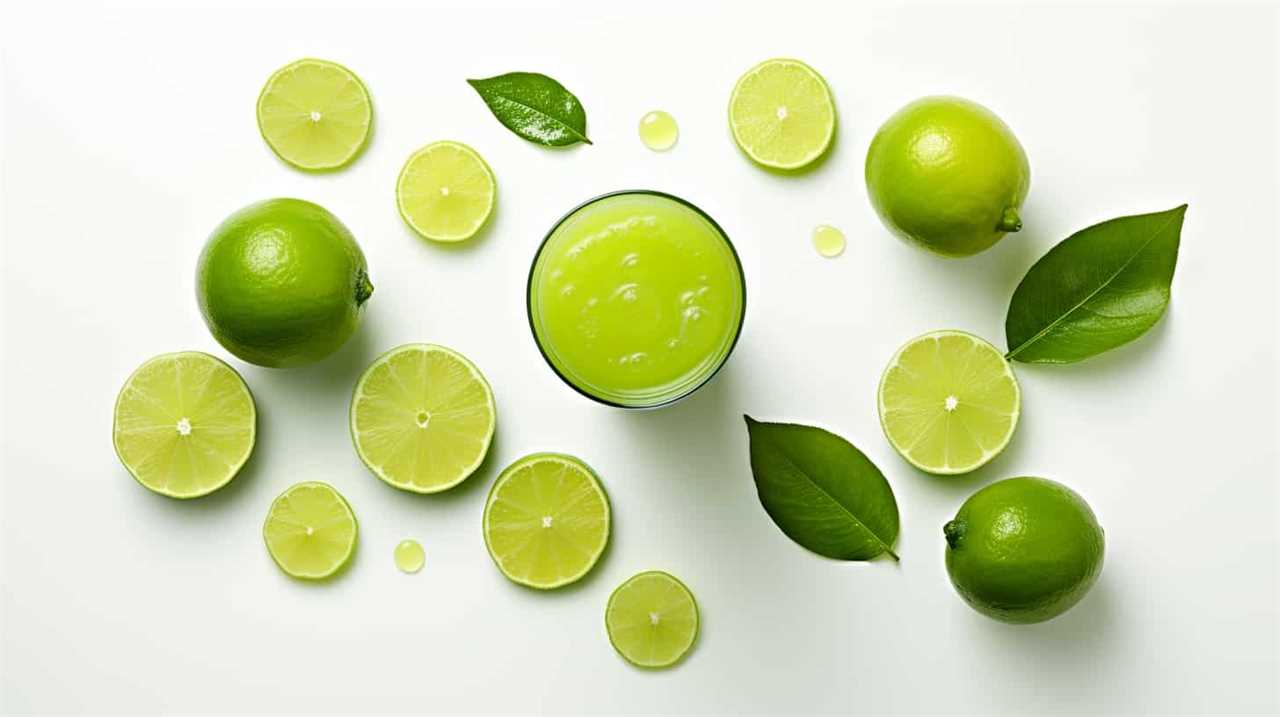
Key Takeaways
- Choose a reputable brand of aloe vera juice that prioritizes quality and uses organic, pure aloe vera.
- Avoid brands that contain added sugars or artificial ingredients.
- Use natural sweeteners like honey, agave syrup, or stevia to enhance the taste of aloe vera juice.
- Experiment with adding fruits, herbs, and other juices to create unique flavor combinations and enhance the health benefits of aloe vera juice.
Choosing the Right Aloe Vera Juice
We can enhance our experience with aloe vera juice by selecting the right brand and type for our preferences. When it comes to finding a reputable brand, it’s important to do some research and read reviews from other consumers. Look for brands that prioritize quality and use organic, pure aloe vera without any added sugars or artificial ingredients. Understanding the health benefits of aloe vera juice is also crucial in making the right choice. Aloe vera is known for its soothing properties, aiding digestion, promoting skin health, and boosting the immune system. By choosing a high-quality brand, we can ensure that we’re getting the maximum benefits from our aloe vera juice.
Now that we know how to choose the right brand, let’s move on to the next step of adding natural sweeteners.
Adding Natural Sweeteners
To enhance the flavor of our aloe vera juice, we can add natural sweeteners such as honey or agave syrup. Using alternative sweeteners not only adds sweetness but also brings unique flavors to the juice. Here are some options to consider:
- Stevia: A natural sweetener derived from the Stevia plant, it’s a zero-calorie alternative to sugar.
- Maple Syrup: This natural sweetener adds a rich and earthy flavor to the aloe vera juice.
- Dates: Pureed dates can be used to sweeten the juice while also providing essential nutrients like fiber.
In addition to using alternative sweeteners, we can enhance the flavor of aloe vera juice by adding spices and extracts. Cinnamon, ginger, or vanilla extract can add warmth and depth to the taste. By experimenting with different combinations of these natural sweeteners, spices, and extracts, we can create a flavor profile that suits our preferences.

Now, let’s move on to the next section and learn how to infuse aloe vera juice with fruits and herbs to further enhance its taste.
Infusing With Fruits and Herbs
As we explore ways to make our aloe vera juice taste better, one option to consider is infusing it with fruits and herbs. Creating unique aloe vera blends by adding fruits and herbs not only enhances the flavor but also adds a touch of freshness and complexity to the juice. For example, combining aloe vera juice with lemon, mint, or berries can create a refreshing drink that’s both delicious and packed with additional nutrients. It’s similar to the ease of making lemonade with bottled juice—quick, convenient, and customizable to suit your preferences. By experimenting with different fruit and herb combinations, you can elevate your aloe vera juice experience while still reaping its health benefits.
Fruits like strawberries, pineapple, or citrus can add a burst of sweetness, while herbs like mint, basil, or ginger can provide a subtle yet refreshing twist. Exploring the benefits of herbal infusions can also be beneficial for our health. For example, adding a few sprigs of lavender can promote relaxation and reduce stress. Additionally, infusing aloe vera juice with rosemary can aid digestion and boost the immune system.
Blending With Other Juices
Let’s try mixing aloe vera juice with different fruit juices to create delicious and refreshing blends. Blending aloe vera juice with other fruits not only enhances its taste but also adds nutritional benefits to your drink. Here are three fruit juices that you can mix with aloe vera juice:

- Orange juice: Combining aloe vera juice with orange juice not only adds a tangy flavor but also boosts your intake of vitamin C, which is essential for a strong immune system.
- Pineapple juice: Mixing aloe vera juice with pineapple juice creates a tropical blend that isn’t only refreshing but also helps in digestion. Pineapple contains bromelain, an enzyme that aids in breaking down proteins and promoting better digestion.
- Watermelon juice: Blending aloe vera juice with watermelon juice creates a hydrating and refreshing combination. Watermelon is rich in water content and contains electrolytes that can help replenish your body’s fluids.
Experimenting With Flavor Combinations
While we can try various flavor combinations with aloe vera juice, it’s important to find the right balance to enhance its taste. Experimenting with different flavors can’t only make the juice more enjoyable but also enhance its health benefits.
Aloe vera juice is known for its numerous health benefits, such as boosting digestion, promoting hydration, and supporting the immune system. By adding complementary flavors, we can create a refreshing summer drink that not only tastes great but also provides a nutritional boost.
Some popular flavor combinations include mixing aloe vera juice with citrus fruits like lemon or orange, adding a splash of coconut water for a tropical twist, or combining it with cucumber and mint for a refreshing and cooling effect.
Don’t be afraid to get creative and find the flavor combination that suits your taste buds best!
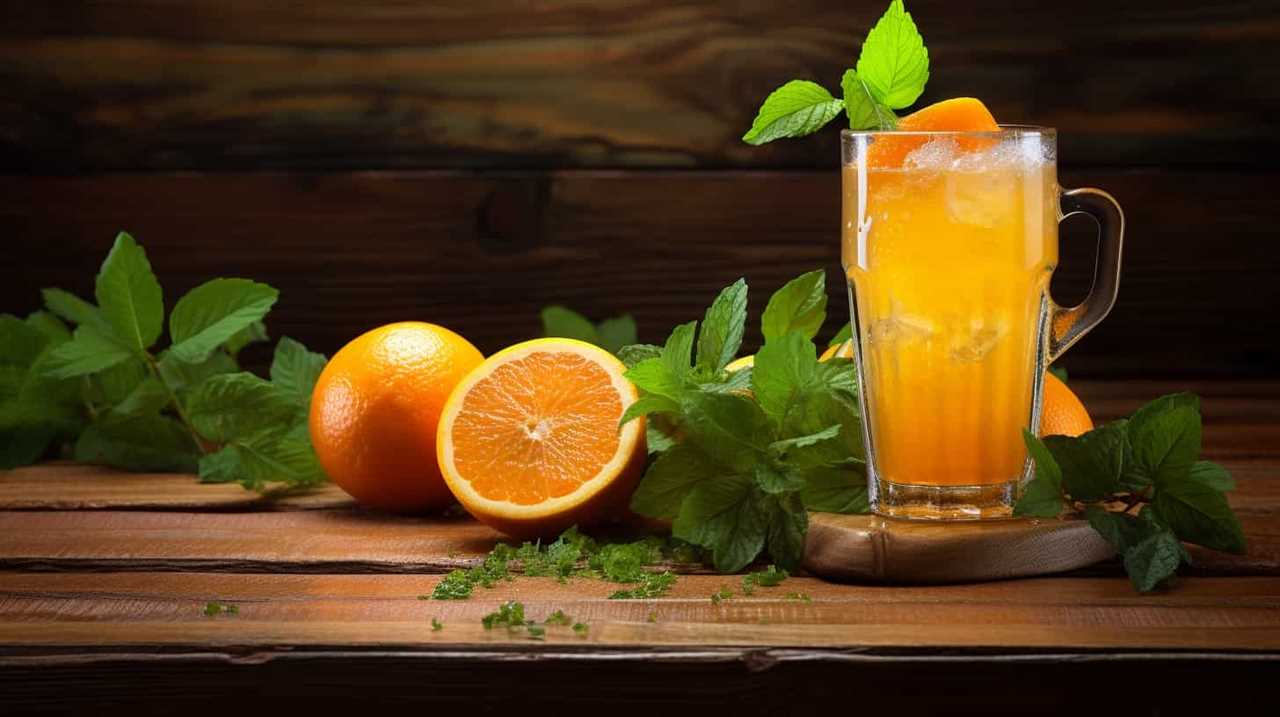
Frequently Asked Questions
Can I Use Store-Bought Aloe Vera Gel Instead of Fresh Aloe Vera for Making Juice?
Yes, you can use store-bought aloe vera gel instead of fresh aloe vera for making juice. However, it’s important to note that fresh aloe vera juice may have more health benefits due to its higher nutrient content.
How Long Can I Store Aloe Vera Juice in the Refrigerator?
Aloe vera juice can be stored in the refrigerator for up to a week. Refrigeration helps maintain the longevity and freshness of the juice, preserving its beneficial properties. It’s important to store the juice in an airtight container to prevent contamination and maintain its quality. Similarly, you might wonder *how long ginger juice lasts*; typically, fresh ginger juice can be refrigerated for about 1–2 weeks as well. Both aloe vera and ginger juices are best consumed within their shelf life to ensure maximum potency and health benefits. Additionally, freezing either juice can extend their shelf life, though some loss of nutrients and potency may occur during the process. When thinking about *how long fresh juice lasts*, it’s crucial to check for signs of spoilage, such as changes in smell, taste, or color, before consuming. To enjoy the best results, it’s always recommended to use fresh ingredients and properly store the juice to ensure you’re getting the most out of its health benefits.
Can Aloe Vera Juice Help With Digestive Issues?
Aloe vera juice can potentially help with digestive issues when taken in appropriate dosages. However, it is important to note that there may be potential side effects. It is always best to consult with a healthcare professional before starting any new supplement regimen.
Can I Use Artificial Sweeteners Instead of Natural Sweeteners in My Aloe Vera Juice?
Using artificial sweeteners in aloe vera juice may affect its taste and potential health benefits. However, natural sweeteners like honey or stevia can enhance the flavor without compromising its nutritional value.

Is It Safe to Drink Aloe Vera Juice Every Day?
Drinking aloe vera juice daily can have numerous benefits, such as improving digestion and boosting the immune system. However, consuming it regularly may also lead to potential side effects like diarrhea or stomach cramps.
Conclusion
In conclusion, making aloe vera juice taste better is easy and enjoyable.
By choosing the right aloe vera juice and adding natural sweeteners, infusing with fruits and herbs, blending with other juices, and experimenting with flavor combinations, you can create a delightful and refreshing drink.
So go ahead and unleash your creativity in the kitchen, and transform your aloe vera juice into a sensational elixir that will transport your taste buds to paradise.
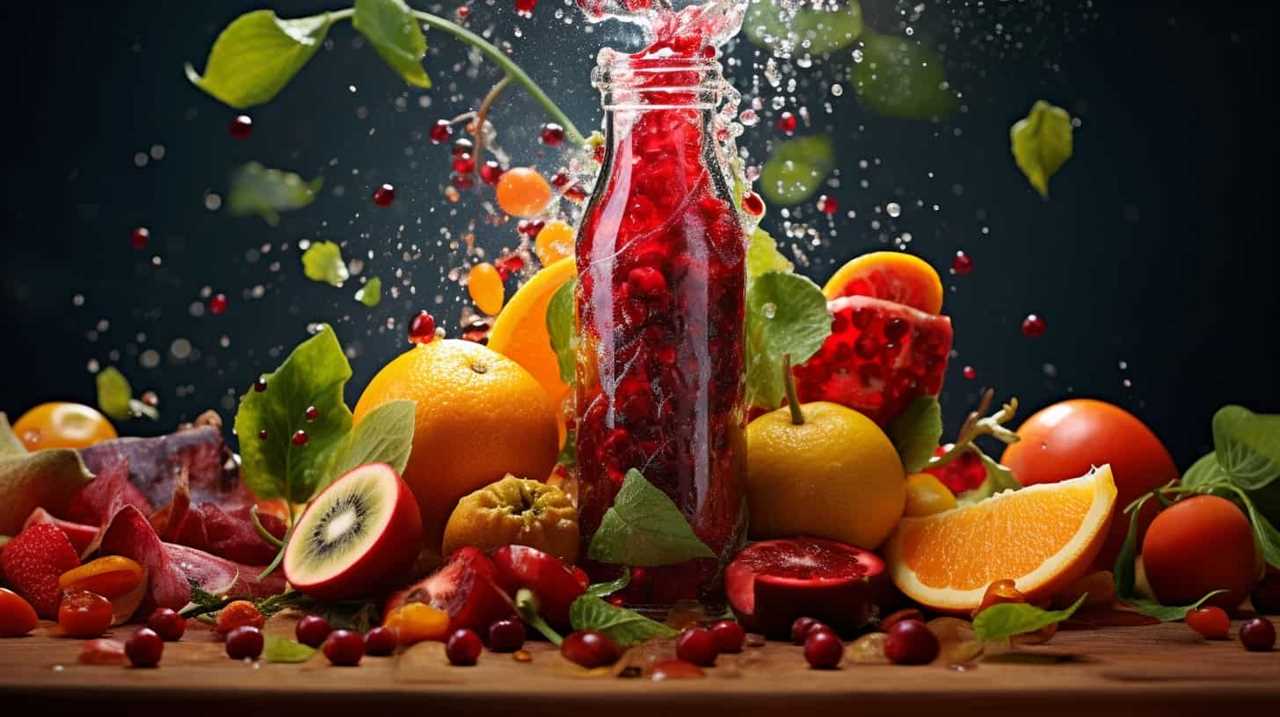
Susannah expertise lies in researching and compiling evidence-based content on juicing, nutrition, and overall health. She is committed to ensuring that The Juicery World offers accurate, up-to-date, and trustworthy information to empower readers to take control of their health. Susannah’s goal is to inspire individuals to embrace juicing as a way to nourish their bodies and live their best lives.
Juice Tips and Tricks
How to Make a Glass of Lemonade With Bottled Lemon Juice

Are you craving a cool glass of lemonade to quench your thirst? Look no further! Try out our perfect recipe using bottled lemon juice that will surely please your taste buds.
In this article, we’ll guide you through the process of creating a tangy and sweet concoction that will leave you feeling refreshed and satisfied.
So grab your ingredients and let’s get started on this delightful journey of serving ourselves and others a glass of pure lemony goodness.
Key Takeaways
- Consider the storage of the bottled lemon juice (dark glass or plastic bottles, protect from light exposure, check expiration date)
- Choose a suitable pitcher and fresh lemons for enhanced flavor
- Store the lemonade concentrate in the refrigerator to maintain freshness
- Adjust the sweetness and tartness to taste with sugar or more lemon juice, and experiment with different sweeteners or additional flavors.
Choosing the Right Bottled Lemon Juice
What are the key factors we should consider when selecting the right bottled lemon juice for our lemonade?

One important factor is how the lemon juice is stored. Look for bottles that are made of dark glass or plastic, as they help protect the juice from light exposure, which can degrade its quality. It’s also important to check the expiration date to ensure freshness.
Another benefit of using bottled lemon juice is convenience. It saves time and effort compared to squeezing fresh lemons. Additionally, bottled lemon juice provides consistent flavor, as the acidity levels are standardized.
When selecting a brand, consider reading reviews and checking for certifications, such as organic or non-GMO.
Gathering the Necessary Ingredients and Tools
How can we gather all the necessary ingredients and tools to make a glass of lemonade with bottled lemon juice? First, we’ll need to collect bottled lemon juice, sugar, and cold water, as well as a pitcher and a spoon for mixing. If you prefer extra flavor, you can also gather ice and optional add-ins like mint or soda water. While preparing the lemonade, it’s easy to understand why some people wonder about other citrus drinks and may ask, “how many oranges per gallon” are needed when making orange juice instead. Once everything is assembled, combine the lemon juice, sugar, and water in the pitcher, stirring until the sugar dissolves. Feel free to adjust the sweetness or tartness to your liking, and don’t forget to add ice or any optional add-ins for an extra refreshing touch. This process might even make you curious about how much juice from oranges is needed when making fresh orange juice compared to using bottled citrus products. Once your lemonade is ready, pour it into a glass and enjoy the refreshing taste. This simple recipe can inspire you to try other homemade juices, such as learning **how to make pear juice** or experimenting with other fruit combinations. Whether you’re using fresh fruits or bottled options, creating your own beverages is a fun and rewarding way to personalize your drinks.
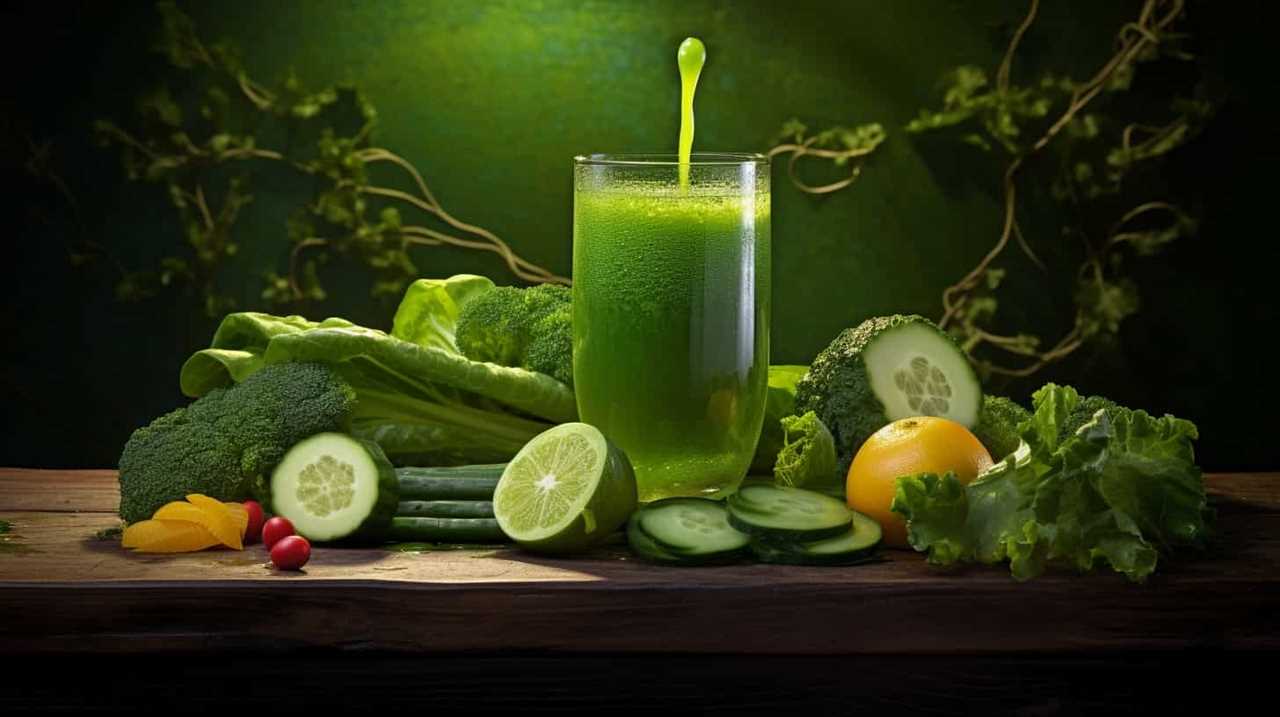
It’s important to start with the right pitcher. Look for a pitcher that’s made of glass or BPA-free plastic, as these materials won’t affect the taste of the lemonade. The pitcher should also have a lid or cover to keep the lemonade fresh and prevent spills.
Now, let’s talk about the lemons. While bottled lemon juice is convenient, using fresh lemons instead can elevate the flavor of your lemonade. Choose lemons that are firm and have a bright yellow color. Give them a gentle squeeze to ensure they’re juicy. To extract the juice, you’ll need a citrus juicer or a reamer. These tools make it easy to get every last drop of juice from the lemons.
Mixing the Lemonade Concentrate
To start mixing the lemonade concentrate, we’ll slowly pour the bottled lemon juice into the pitcher. It’s important to choose the right container for the lemonade concentrate. A pitcher with a lid or a tightly sealed container will help maintain the freshness and prevent any spills or leaks. Once the lemon juice is in the pitcher, we can move on to the next step of adding water and sweetener.
To ensure the lemonade concentrate stays fresh, it’s essential to store it properly. Keep the pitcher in the refrigerator to maintain its cool temperature and prevent any bacteria growth. If you have any leftover concentrate, transfer it to a smaller container with an airtight lid before refrigerating. This will help retain its flavor and prevent any contamination.

Now that we’ve mixed the lemonade concentrate, it’s time to adjust the sweetness and tartness to taste.
Adjusting the Sweetness and Tartness to Taste
We can adjust the sweetness and tartness of the lemonade to taste by adding more sugar or lemon juice, respectively. If you prefer a sweeter lemonade, simply add more sugar and stir until it dissolves completely. You can experiment with different sweeteners such as honey or agave syrup to find the perfect balance of sweetness.
On the other hand, if you want a tangier lemonade, add more lemon juice gradually, tasting as you go until it reaches your desired level of tartness.
Additionally, you can get creative with your lemonade by adding flavors like fresh mint leaves or a hint of lavender. These additions can elevate the flavor profile and create a more refreshing and unique experience.

Now that we’ve adjusted the sweetness and tartness of our lemonade, let’s move on to serving and enjoying your refreshing glass of lemonade.
Serving and Enjoying Your Refreshing Glass of Lemonade
Now let’s sit back, relax, and savor our refreshing glass of lemonade.
When it comes to serving and enjoying this delightful drink, there are a few techniques and garnishing options to consider.
Firstly, serving your lemonade chilled is essential for maximum enjoyment. Ensure that you have chilled glasses or add ice cubes to the glasses before pouring the lemonade.

To add a touch of elegance, you can garnish your lemonade with a slice of lemon on the rim of the glass. For an extra burst of flavor, you could also add a sprig of fresh mint or a few berries.
Remember to gently stir the lemonade before serving to evenly distribute the flavors.
Now, take a sip, feel the refreshing tang of lemon, and let the sweet and tart flavors dance on your taste buds.
Cheers!
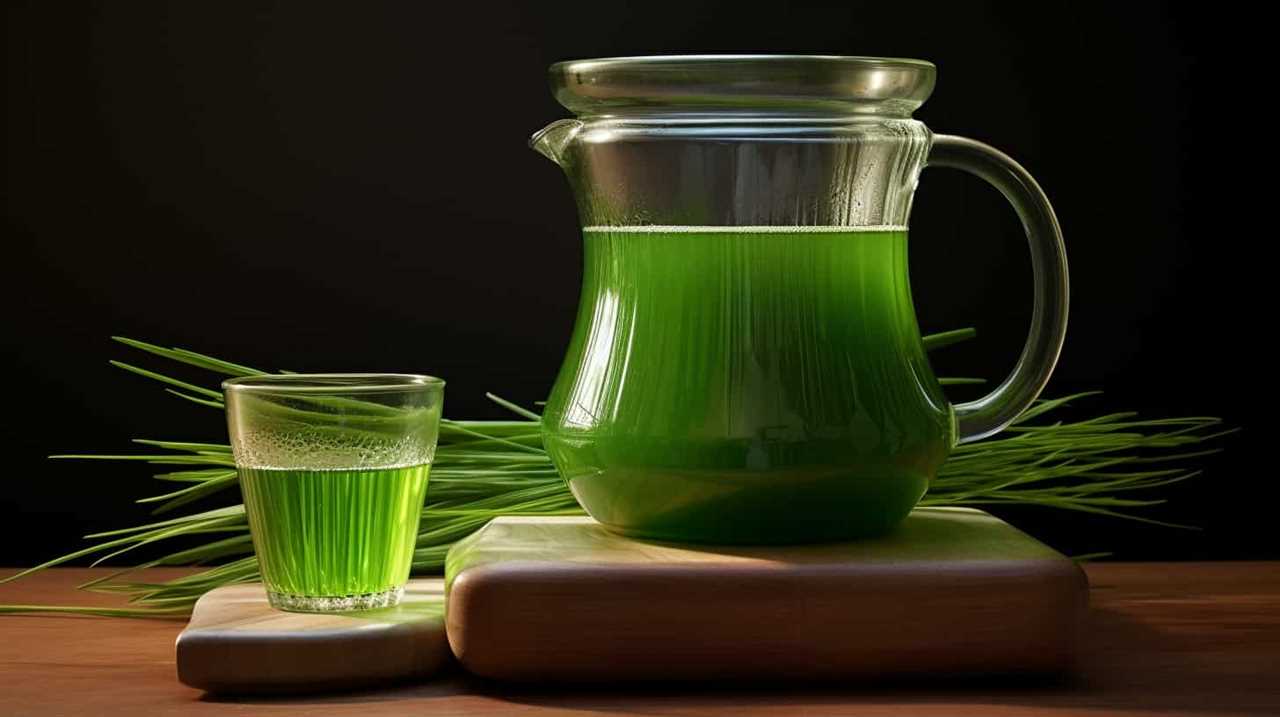
Frequently Asked Questions
Can I Use Fresh Lemons Instead of Bottled Lemon Juice?
Fresh lemons offer numerous benefits over bottled lemon juice. The taste of fresh lemons is unparalleled, providing a vibrant and tangy flavor. Incorporating fresh lemons into your lemonade will elevate its taste and give it a refreshing and authentic twist.
Can I Substitute Sugar With a Different Sweetener?
Substituting sweeteners in lemonade can enhance the flavor and offer health benefits. We’re knowledgeable about alternative sweeteners and can provide precise, detailed instructions on using them in place of sugar.
How Long Does the Lemonade Concentrate Need to Chill in the Refrigerator?
The chilling time for the lemonade concentrate in the refrigerator is typically around 1-2 hours. Using bottled lemon juice offers the benefit of convenience and consistent flavor for a refreshing glass of lemonade.
Can I Add Other Fruits or Flavors to the Lemonade?
Sure, we can definitely add different fruits or flavors to our lemonade. It’s a great way to experiment with unique flavors and create refreshing, personalized drinks. The possibilities are endless!

How Long Does the Lemonade Stay Fresh in the Refrigerator?
Lemonade made with bottled lemon juice can stay fresh in the refrigerator for about 5-7 days. To maximize shelf life, store it in an airtight container and keep it chilled.
Conclusion
And so, with a few simple steps and the right ingredients, a glass of refreshing lemonade is born.
Like a symphony of flavors dancing on your taste buds, this tangy elixir quenches thirst and brings joy on a hot summer day.
Just a sip transports you to a world of citrusy delight, where the sweetness and tartness blend harmoniously.

So go ahead, indulge in the art of lemonade-making and savor every drop of this sun-kissed nectar.
Cheers to the perfect glass of lemonade!
Susannah expertise lies in researching and compiling evidence-based content on juicing, nutrition, and overall health. She is committed to ensuring that The Juicery World offers accurate, up-to-date, and trustworthy information to empower readers to take control of their health. Susannah’s goal is to inspire individuals to embrace juicing as a way to nourish their bodies and live their best lives.
Juice Tips and Tricks
How to Know if Orange Juice Is Bad

We’ve all been in that situation before – reaching for a glass of orange juice and hesitating, unsure if it’s still okay to drink. Fear not! This article will give you the knowledge you need to determine for sure if your orange juice is still fresh or if it’s gone bad.
With a blend of scientific precision and practical tips, we’ll explore color changes, strange smells, off taste, texture changes, and mold or growth that may indicate spoilage.
Let’s dive in and serve ourselves a refreshing glass of certainty!
Key Takeaways
- Color changes in orange juice can indicate a loss of freshness and shelf life extension, but it doesn’t necessarily mean the juice is bad.
- Unusual or off-putting odors in orange juice, such as sour or fermented scents, can be a sign of poor quality.
- An off taste in orange juice, such as sour, bitter, or fermented flavors, suggests that the juice is spoiled.
- Texture changes in orange juice, such as pulp separation or a thicker consistency, can occur as the juice ages, so it’s important to consume it before the expiration date.
Color Changes in Orange Juice
We should be aware that color changes can indicate whether orange juice is bad.

When it comes to orange juice, color is a crucial factor to consider. As oranges are exposed to air, an oxidation process occurs, which leads to changes in color. Fresh orange juice has a vibrant orange hue, indicating its freshness and high nutritional value.
However, as time passes, the juice may undergo a color change, turning dull or brownish. This change in color is a result of the oxidation process, which affects the flavor and quality of the juice. It’s important to note that while a change in color doesn’t necessarily mean the juice is bad, it does indicate that the juice is losing its freshness and shelf life extension.
Therefore, it’s advisable to consume orange juice when it’s at its freshest, as indicated by its vibrant orange color.
Strange Smells in Orange Juice
When it comes to evaluating orange juice, we should be cautious of any strange smells or odors. A fresh, pleasant smell is indicative of good quality orange juice. However, if you notice any unusual or off-putting odors, it may be a sign that the juice has gone bad. These smells can range from a sour or fermented scent to a rancid or moldy aroma.

It’s important to note that while some natural variations in scent can occur due to the specific variety of oranges used, any strong or unpleasant smells should raise concerns. If you have citrus fruit allergies, it’s especially important to pay attention to the smell of orange juice, as it could indicate the presence of spoilage or contamination.
Ensuring the quality of orange juice is essential as it’s a popular beverage known for its health benefits, including being rich in vitamin C and antioxidants.
Off Taste of Orange Juice
Our taste buds can detect even the slightest hint of an off taste in orange juice, which can indicate that it has gone bad. The taste of orange juice should be fresh, tangy, and slightly sweet. If it tastes sour, bitter, or fermented, it’s likely spoiled.
One common cause of an off taste in orange juice is the use of overripe oranges. When oranges become overripe, their flavor profile changes, resulting in a less pleasant taste. Another factor to consider is the expiration date. Orange juice that has passed its expiration date is more likely to develop an off taste. It’s important to check the expiration date before consuming orange juice to ensure its freshness and quality. Additionally, improper storage conditions, such as leaving the juice at room temperature for extended periods, can lead to the development of unpleasant flavors. Storing orange juice in the refrigerator helps maintain its freshness for longer. For those exploring different juice options, aloe vera juice flavor tips suggest pairing tart juices with milder flavors to balance the overall taste.
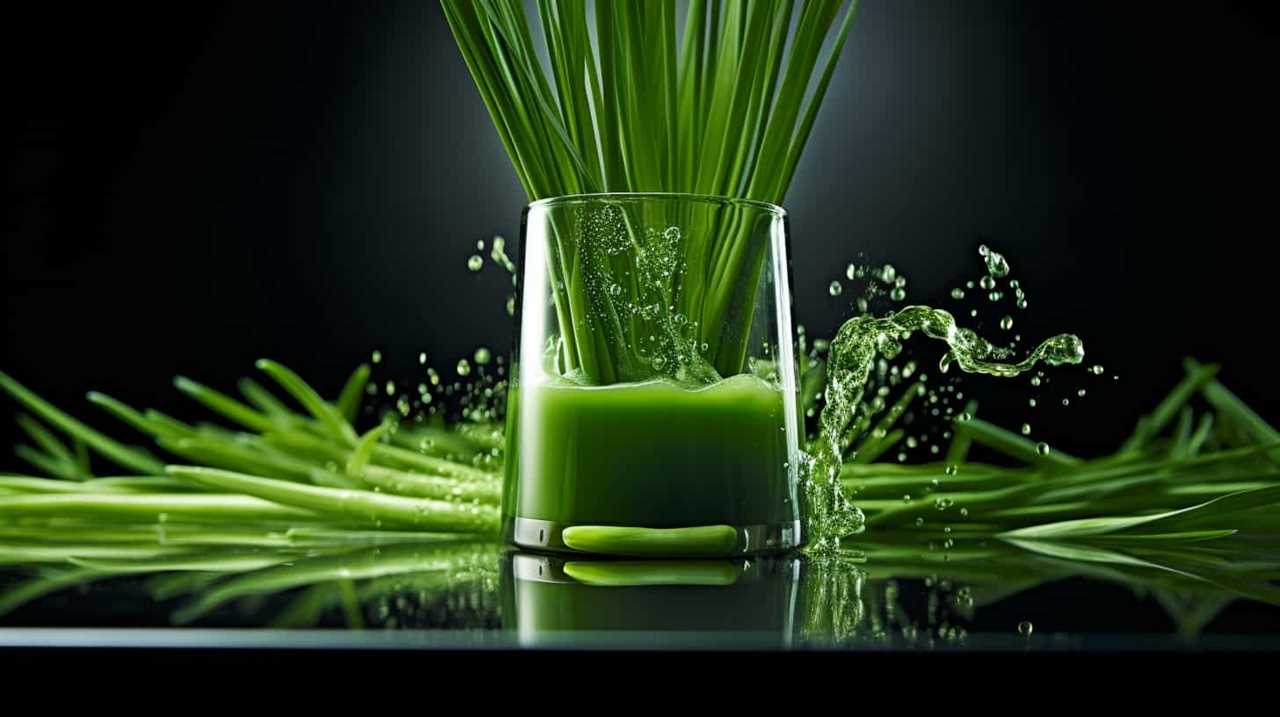
Now, let’s move on to discuss the texture changes in orange juice.
Texture Changes in Orange Juice
As we explore the texture changes in orange juice, it’s important to note that certain factors can cause it to become thicker or develop sediment. One common texture change in orange juice is pulp separation, where the pulp separates from the liquid and settles at the bottom. This can occur naturally over time, as the pulp particles become denser and sink.
Another factor that can affect the texture of orange juice is the expiration date. As orange juice ages, it may start to develop a thicker consistency and even form sediment. This is a result of the natural breakdown of the juice’s components. Therefore, it’s crucial to check the expiration date on orange juice and consume it before it reaches its expiration date to avoid any undesirable texture changes.
Mold or Growth in Orange Juice
We need to be aware of the possibility of mold or other growth occurring in orange juice. Mold can develop in orange juice if it isn’t stored properly or if it has passed its expiration date.
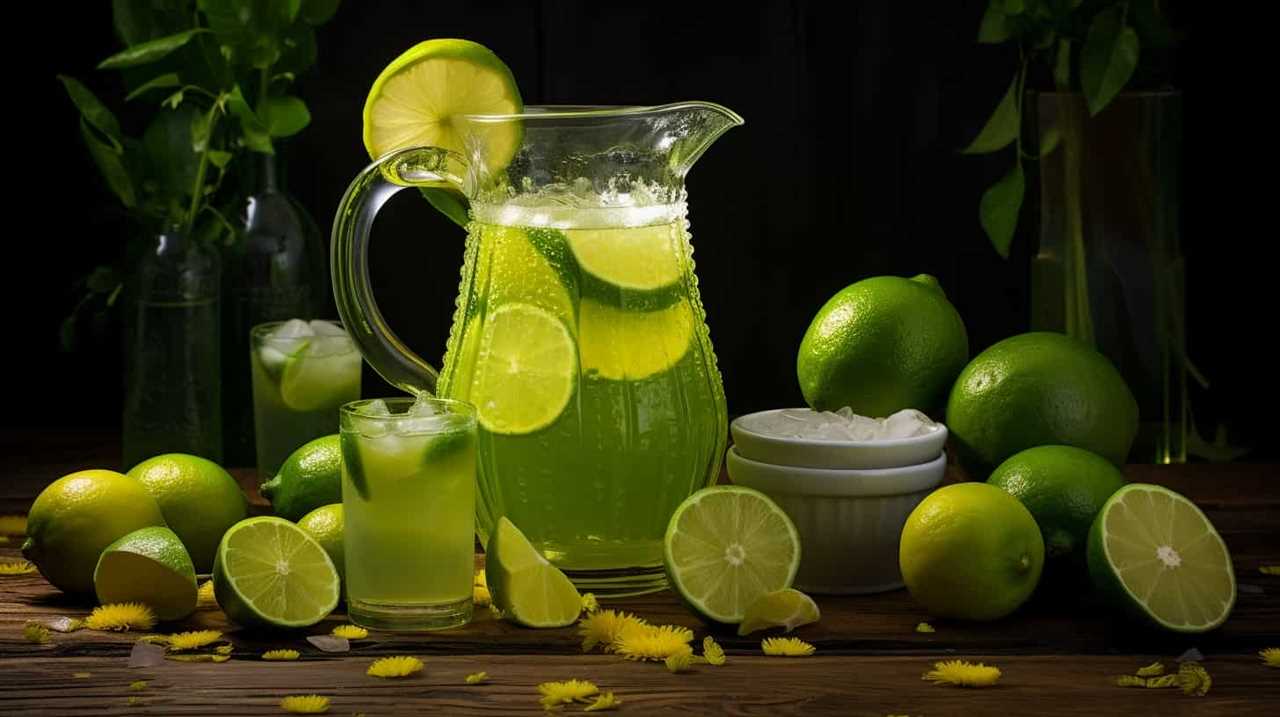
To prevent mold growth, it’s important to follow these steps:
- Store orange juice in the refrigerator at a temperature below 40°F (4°C).
- Check the expiration date on the bottle before consuming. Discard any orange juice that has expired.
- Keep the container tightly sealed to prevent air and moisture from entering, as these can promote mold growth.
Regularly inspecting orange juice for any signs of mold or unusual growth is essential. If you notice any discoloration, a strange odor, or visible mold, it’s best to discard the juice to avoid any potential health risks.
Frequently Asked Questions
Can Orange Juice Go Bad if It’s Stored in the Freezer for Too Long?
Frozen orange juice can potentially lose its nutrients and change its taste if stored in the freezer for too long. It is important to check for signs of spoilage before consuming it.
How Long Can Orange Juice Stay Fresh in the Refrigerator Once It’s Opened?
Once opened, orange juice can stay fresh in the refrigerator for about 7-10 days. To maintain its freshness, store it properly by keeping it tightly sealed and at a consistently cold temperature. If the orange juice develops an off odor, flavor, or appearance, it’s best to discard it to avoid any potential health risks. Factors like exposure to air and varying temperatures can influence how long orange juice lasts, so it’s crucial to handle it with care. Always check the expiration date as a general guide, but remember that proper storage can extend its freshness slightly. Additionally, avoid leaving the orange juice out at room temperature for extended periods, as this can significantly shorten how long orange juice lasts. Freezing the juice can be another option to extend its shelf life, but be aware that this may alter its texture and taste once thawed. By following these precautions, you can ensure your orange juice stays fresh and safe to consume.
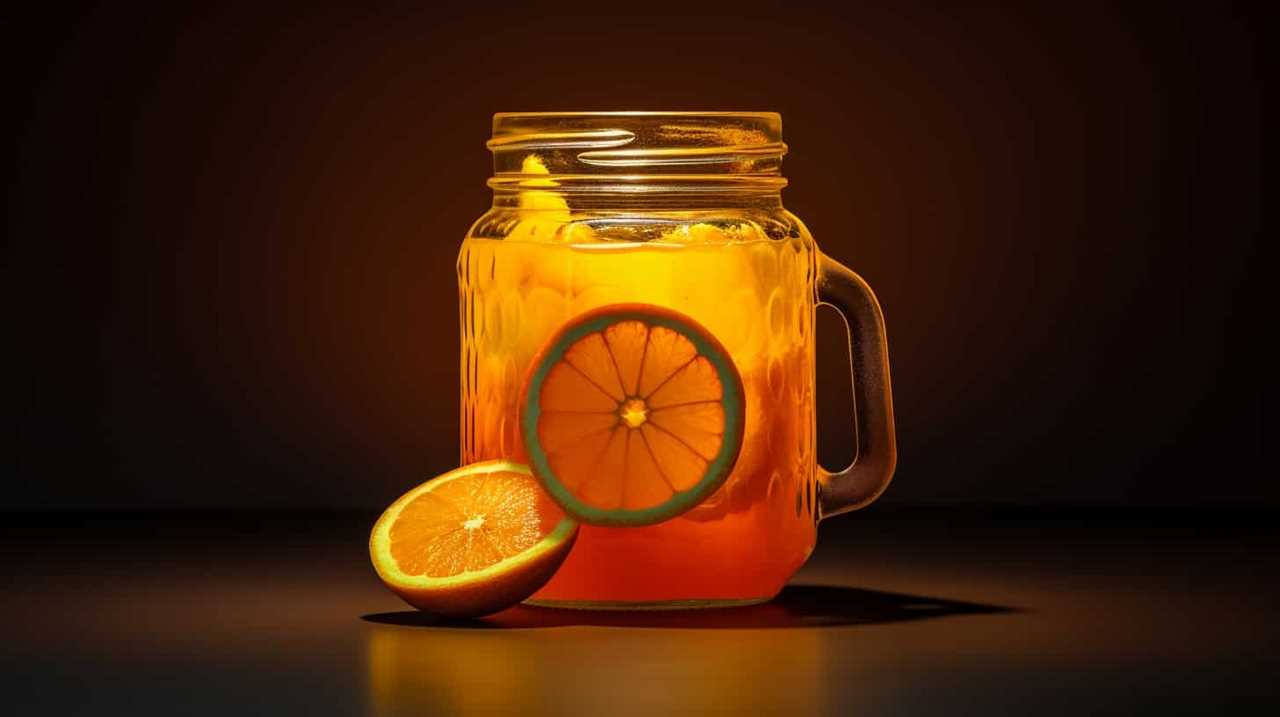
Is It Safe to Consume Orange Juice That Has Been Left Out at Room Temperature Overnight?
Left out orange juice may not be safe to drink as it can harbor harmful bacteria. Signs of spoiled orange juice include a sour smell, mold growth, and a change in color or taste.
Can Orange Juice Develop Harmful Bacteria if It’s Past Its Expiration Date but Still Looks and Smells Fine?
Orange juice can cause food poisoning if it develops harmful bacteria, even if it looks and smells fine. Signs of spoiled orange juice include a sour smell, mold growth, and a change in color or taste.
Does the Nutritional Value of Orange Juice Decrease as It Starts to Go Bad?
As orange juice goes bad, its nutritional value decreases. The longer it sits on the shelf, the more nutrients it loses. Signs of spoilage include a sour smell, off taste, and mold growth.
Conclusion
In conclusion, determining if orange juice is bad requires careful observation of color changes, strange smells, off taste, and texture changes. Just like a detective investigating a case, we must rely on our senses to detect any signs of spoilage.
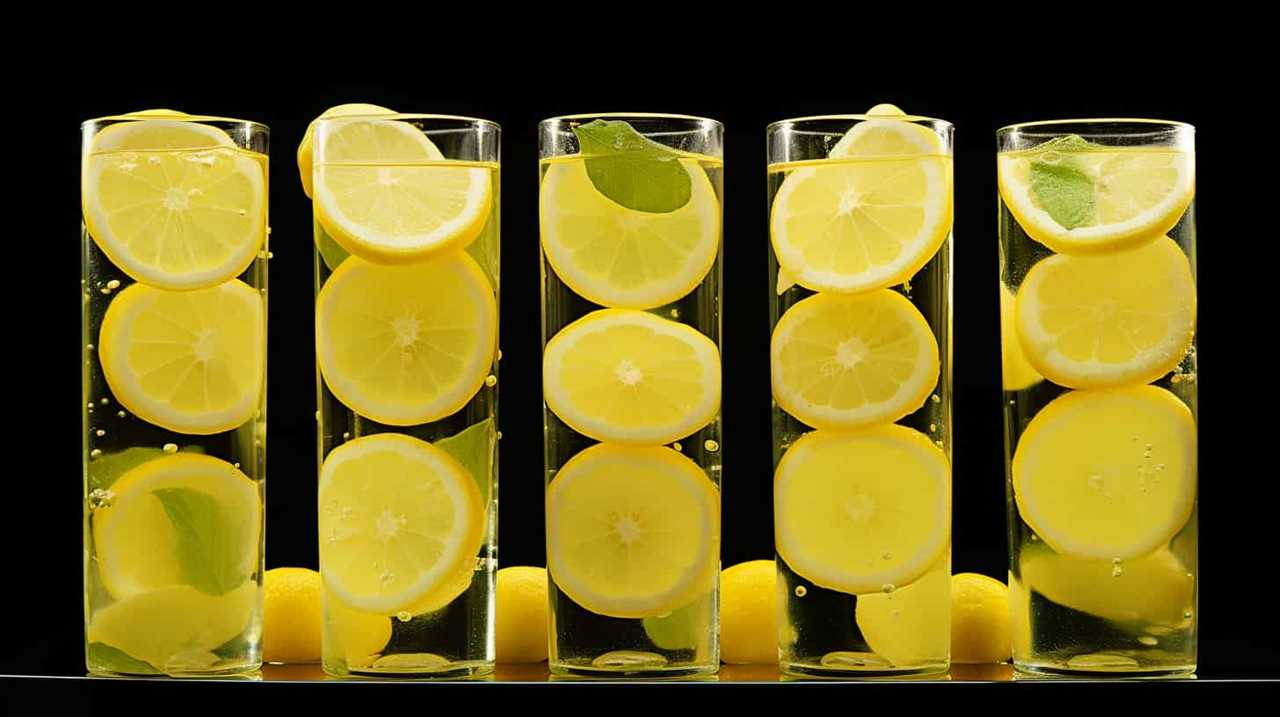
If we detect mold or growth in the orange juice, it’s a clear indication that it’s no longer safe to consume. By remaining vigilant and attuned to these indicators, we can ensure that our orange juice is always fresh and enjoyable.
Susannah expertise lies in researching and compiling evidence-based content on juicing, nutrition, and overall health. She is committed to ensuring that The Juicery World offers accurate, up-to-date, and trustworthy information to empower readers to take control of their health. Susannah’s goal is to inspire individuals to embrace juicing as a way to nourish their bodies and live their best lives.
-

 Vetted2 months ago
Vetted2 months ago15 Best Juices for Diabetics: Refreshing Options That Won’t Spike Your Blood Sugar
-

 Vetted2 months ago
Vetted2 months ago15 Best Decaf Coffee Options for Flavor Lovers Who Need a Caffeine Break
-

 Vetted2 months ago
Vetted2 months ago15 Best Espresso Ground Coffees to Elevate Your Morning Brew
-

 Vetted2 months ago
Vetted2 months ago15 Best K-Cup Coffee Pods for a Perfect Brew Every Time
-

 Vetted2 months ago
Vetted2 months ago15 Best Beans for Espresso: A Guide to Perfecting Your Brew
-

 Vetted2 months ago
Vetted2 months ago15 Best Inexpensive Espresso Machines That Brew Quality Coffee on a Budget
-

 Vetted2 months ago
Vetted2 months ago15 Best Kona Coffees to Savor the Rich Flavors of Hawaii
-

 Vetted2 months ago
Vetted2 months ago15 Best Cold Brew Coffees to Keep You Refreshed All Summer Long
















